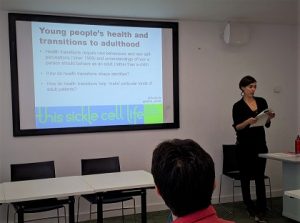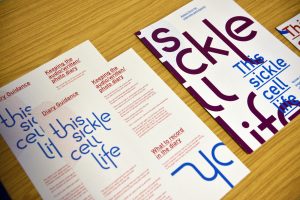What is the legacy of medical sociology? How has it shaped other disciplines and practices? And what is its role in challenging the status quo of inequalities in health?
These were some of the topics discussed by very talented people at this year’s MedSoc (Medical Sociology) Conference in Glasgow. These were also some of the issues that drove our aim to explore how transitions to adulthood for young people with sickle cell could be improved and how healthcare services could help support these. The conference provided a great opportunity to present our sickle cell research.

Our presentation focused on how health transitions shape the identities of young people and how this contributes to the ways in which young people develop into adult patients. Transitions to adulthood can often bring challenges, and for young people with sickle cell, the challenges often faced in education, social and emotional transitions to adulthood are complicated by their condition, and they must navigate these complex changes as well as changes in their hospital care that can bring problems as they move from child to adult health services.
There was a range of interesting presentations to choose from. Martyn Pickersgill’s fascinating talk about the dialectic between patient experience and diagnostic practice, resonated with some of our findings on the hybridisation of knowledge through the dialogue between ‘subjective’ patient experiences and ‘objective’ evidence. Charlotte Kühlbrandt’s ethnographic paper helped to shed light on the intricate relationship between citizenship/non-citizenship and patienthood/non-patienthood in the context of Roma Health Mediation in Romania. In this case, health mediation becomes correction in the production of normative forms of citizens and patients. In our case, we showed how healthcare transitions become self-disciplining ‘at a distance’ and form part of a relentless process of self-governance through which young people try to become the types of patient and citizens they ought to be.
Eva Krockow made us think about how we balance the individual versus collective good when we make choices about antibiotic prescribing.
 The panel plenary, with a focus on inequalities, was fascinating. The keynote papers from Professor Ellen Annandale discussed the ‘gendering’ of health inequalities and the embodiment of global gender power relations such as the health consequences of biogenetic trade. Professor Hannah Bradby pointed out barriers faced by forced migrants across Europe, the stratification of migrant status and how this interacts with “acceptable” forms of vulnerability. Some migrants find themselves having to amplify and enact their vulnerability (mental health) to access care and citizenship status. Professor Graham Scambler’s keynote paper on “What’s Left of Class for medical sociology?” encouraged discussion about our role as sociologist activists in challenging health inequalities.
The panel plenary, with a focus on inequalities, was fascinating. The keynote papers from Professor Ellen Annandale discussed the ‘gendering’ of health inequalities and the embodiment of global gender power relations such as the health consequences of biogenetic trade. Professor Hannah Bradby pointed out barriers faced by forced migrants across Europe, the stratification of migrant status and how this interacts with “acceptable” forms of vulnerability. Some migrants find themselves having to amplify and enact their vulnerability (mental health) to access care and citizenship status. Professor Graham Scambler’s keynote paper on “What’s Left of Class for medical sociology?” encouraged discussion about our role as sociologist activists in challenging health inequalities.
With Scambler’s call to action, I left the conference eager to continue my commitment to medical sociology and critical engagement with inequalities in health. You can keep up to date with our work in these areas via our website, DEPTH twitter account and our This Sickle Cell Life project twitter account.

